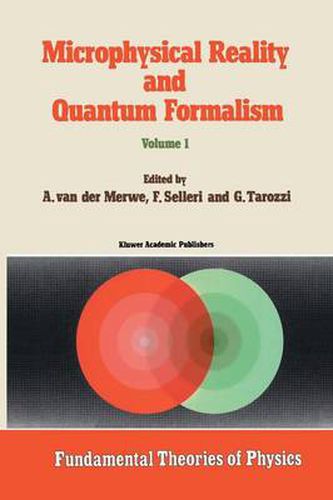Readings Newsletter
Become a Readings Member to make your shopping experience even easier.
Sign in or sign up for free!
You’re not far away from qualifying for FREE standard shipping within Australia
You’ve qualified for FREE standard shipping within Australia
The cart is loading…






This title is printed to order. This book may have been self-published. If so, we cannot guarantee the quality of the content. In the main most books will have gone through the editing process however some may not. We therefore suggest that you be aware of this before ordering this book. If in doubt check either the author or publisher’s details as we are unable to accept any returns unless they are faulty. Please contact us if you have any questions.
Quantum mechanics has reached maturity as an a wesome scientific theory, and undeniably no experiment has so far produced any result conflic ting with its predictions. Nevertheless, an increasing number of scholars are seriously questioning the limits of this discipline’s validity, a fact that is eloquently attested to by the four international conferences devoted to the foundations of quantum theory which were held in 1987 alone - in Joensuu, Vienna, Gdansk, and Delphi, respectively. There is an increa~ing awareness that the founding fathers of quantum mechanics have left behind a theory which, though spectacularly successful in its applications, severely limits our intuitive understanding of the microworld, and that their reasons for doing so were at least partly arbitrary and open to question. The problem of the relationship between the existing quantum theory and objective reality at the atomic and subatomic levels can be tackled in essentially two ways: (i) One may focus attention on the formalism of the theory and attempt to deduce from it a coherent description of our measuring processes and a deeper understanding of the microworld. Oi) Alternatively, one may start from the experimental evidence and/or from models of the objective reality compatible with it and go on to inves tigate whether or not formalization of this knowledge can be accomodated within the broad confines of existing quantum theory.
$9.00 standard shipping within Australia
FREE standard shipping within Australia for orders over $100.00
Express & International shipping calculated at checkout
This title is printed to order. This book may have been self-published. If so, we cannot guarantee the quality of the content. In the main most books will have gone through the editing process however some may not. We therefore suggest that you be aware of this before ordering this book. If in doubt check either the author or publisher’s details as we are unable to accept any returns unless they are faulty. Please contact us if you have any questions.
Quantum mechanics has reached maturity as an a wesome scientific theory, and undeniably no experiment has so far produced any result conflic ting with its predictions. Nevertheless, an increasing number of scholars are seriously questioning the limits of this discipline’s validity, a fact that is eloquently attested to by the four international conferences devoted to the foundations of quantum theory which were held in 1987 alone - in Joensuu, Vienna, Gdansk, and Delphi, respectively. There is an increa~ing awareness that the founding fathers of quantum mechanics have left behind a theory which, though spectacularly successful in its applications, severely limits our intuitive understanding of the microworld, and that their reasons for doing so were at least partly arbitrary and open to question. The problem of the relationship between the existing quantum theory and objective reality at the atomic and subatomic levels can be tackled in essentially two ways: (i) One may focus attention on the formalism of the theory and attempt to deduce from it a coherent description of our measuring processes and a deeper understanding of the microworld. Oi) Alternatively, one may start from the experimental evidence and/or from models of the objective reality compatible with it and go on to inves tigate whether or not formalization of this knowledge can be accomodated within the broad confines of existing quantum theory.